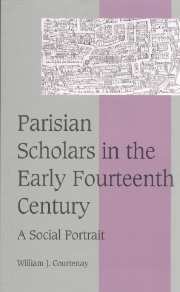Book contents
- Frontmatter
- Contents
- List of maps and figures
- Preface
- List of abbreviations
- INTRODUCTION: PARIS IN 1329
- Part I The recovery and context of a document
- 1 THE COMPUTUS OF 1329–1330
- 2 COLLECTAE AND UNIVERSITY FINANCE
- 3 PRECIPITATING EVENT: THE RAPE OF SYMONETTE
- Part II A window on a lost world
- Part III Biographical register
- Select bibliography
- Index of persons and places
- Subject index
- Cambridge Studies in Medieval Life and Thought Fourth series
1 - THE COMPUTUS OF 1329–1330
Published online by Cambridge University Press: 17 August 2009
- Frontmatter
- Contents
- List of maps and figures
- Preface
- List of abbreviations
- INTRODUCTION: PARIS IN 1329
- Part I The recovery and context of a document
- 1 THE COMPUTUS OF 1329–1330
- 2 COLLECTAE AND UNIVERSITY FINANCE
- 3 PRECIPITATING EVENT: THE RAPE OF SYMONETTE
- Part II A window on a lost world
- Part III Biographical register
- Select bibliography
- Index of persons and places
- Subject index
- Cambridge Studies in Medieval Life and Thought Fourth series
Summary
In the last quire of the oldest surviving register of the proctors of the English-German nation at Paris is a record of monies collected from university members and associates to meet a special, unspecified financial need. Like the survival of the Plan of St Gall, which might eventually have been discarded had not its obverse been used to record a life of St Martin, this financial record, or computus, would not have been retained for long had not a blank page at the end of the quire been used in May 1344 to record the annual financial report of the receptor for the previous academic year – a type of record that was usually included in the proctors' register in the early fourteenth century before separate registra receptorum were instituted. When the 1344 report was included for binding with the records of the nation for the 1331–47 period, the entire quire was retained intact, perhaps on the assumption that the list of payments was somehow related to the receptor's report.
The type of source to which this text belongs is a financial account (computus, compte) that resulted from a collectio or collecta of money from masters and students at the university of Paris, not just the English-German nation.
- Type
- Chapter
- Information
- Parisian Scholars in the Early Fourteenth CenturyA Social Portrait, pp. 9 - 27Publisher: Cambridge University PressPrint publication year: 1999

